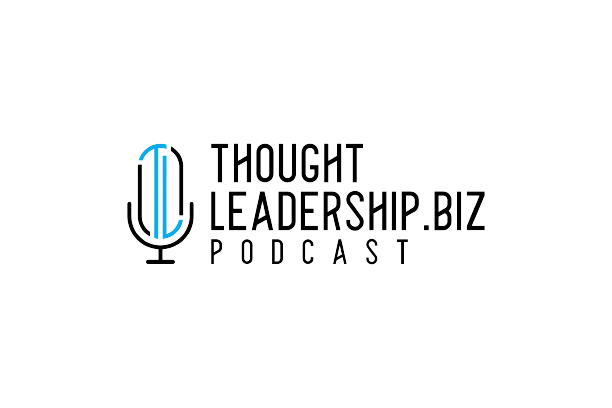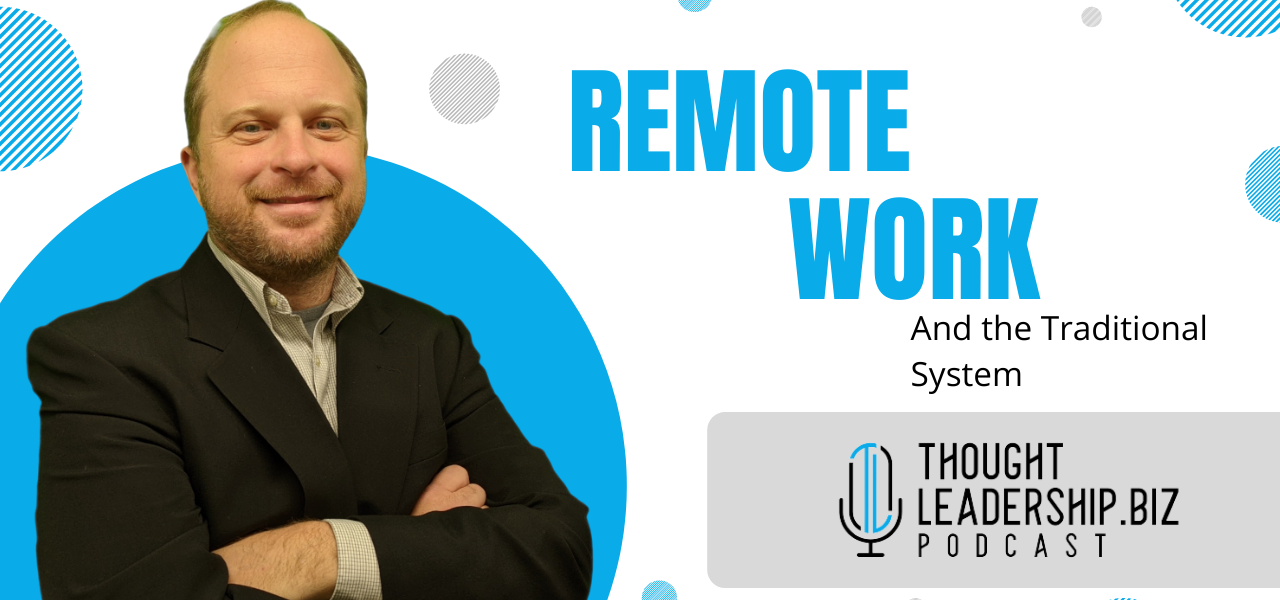
Read / Watch / Listen
Stream this article from your favorite podcast audio or video streaming service as referenced below.
Read: Below
Watch: https://youtu.be/zAaE34BLkWs
Listen: https://anchor.fm/thoughtleadershipbiz
More ways to read, watch and listen:
Read the Article
Hi everyone, and welcome to another mind-blowing episode of ThoughtLeadership.biz. I’m Chris Machut and in today’s show we’ll be talking about why remote working works.
*****
Before 2020, there were careful, concerned and almost conspiratorial whispers in thousands of corporate corridors across the globe. Although they spoke in different languages, they all asked the same question:
“With all of this new tech at our fingertips, do we really ALL need to be in the office every day just to get our work done?”
It remained a rhetorical question – until the pandemic forced organizations to not only answer it, but also respond. And in record time.
Now we’ve surfed the first remote-working wave to the shore and most business have some kind of strategy in place, we face a bunch of new questions, like:
“Is remote working now here to stay? Is a fully remote or a partially remote hybrid the best option? What are the long-term consequences of moving to widespread remote working?”
In this episode, I’m not going to try and answer those questions, but instead focus on what we DO know about remote working and what 7 of the best benefits are.
So, let’s get started.
*****
Adopting a remote working approach comes with some major plusses. But, as you would expect, there are some downsides too. For example, in the good old days I used to crack jokes that had the team rolling on the floor with laughter, but apparently now my jokes aren’t remotely funny.
But you can’t have everything, I guess.
So, today we’ll be focusing on the benefits of remote working and how to make it work best for you and your organization.
*****
But before we go there, let me remind you to check out all my newest articles, podcasts
and more at ThoughtLeadership.biz, catch me in person on YouTube and listen via
Spotify and Anchor.fm, as well as Apple and Google Podcasts. Why not also get yourself over to Twitter and LinkedIn, where you can subscribe for all my sage-like entrepreneurial updates?
*****
So, what’s so great about remote working? Well, I’d say that once you get over the initial learning curve, get slick systems in place and train up your teams, there are at least 7 great things about it.
Let’s start with the general stuff.
People are becoming more and more attracted to remote working because it provides the flexibility and autonomy that humans instinctually crave. When we work remotely we have much greater control over our professional career and our private lives.
Depending on our position within the organization and how it’s set up, we can often chose how, when and where we work, so what was once the heavenly domain of a select few elite entrepreneurs is now readily available to the working masses. Coronavirus has forced the hands of businesses and demanded that they rewrite the rulebook and recalibrate the ways in which they work.
The result? A global workplace and workforce that’s in many ways more flexible, future-proof, productive and effective than ever.
Alright, so now let’s have a look at 7 specific benefits to working remotely.
1. Lower Expenses
Organizations that embrace remote working can make huge savings on the costs they’d normally incur for on site operations. As business owners that’s obviously a massive plus for us. Some estimates suggest we can save over $10000 big ones annually on a remote worker who ‘telecommutes’ 50 percent of the time. This means that we can make massive savings while not sacrificing our workflow, output or bricks-and-mortar operations. Instead, we can create a hybrid system which harnesses the benefits of both ways of working.
2. More Productive Application Process
Hiring remotely removes many of the traditional obstacles and clears the way for a much more productive and painless application process. With no need for physical interview spaces, no commuting arrangements to be made and no wasted travel time and associated costs, hiring managers and applicants can focus their time and energy on what really counts. With virtual environments just a click of the mouse away, applicants can be screened, evaluated and selected with ease and administration kept to a minimum.
3. Supercharged Productivity
Less distractions, zero commuter stress, freedom to work the hours that work best means that by allowing – and even encouraging – our teams to work remotely when it makes sense, we helping to optimize the conditions for their proficiency and productivity. The idea that those who work in their own time remotely are pseudo-professionals who can’t handle rea; work is not only outdated, the stats tell a very different story. Those who work remotely often outperform their office-based peers by staying on task more and being generally less distracted.
4. Crisis Ready
In this day and age, we all know what a global crisis feels like and what damage it can do to organizations that aren’t prepared, or aren’t flexible enough, skilled enough, or visionary enough to pivot and adapt as they need to.
So, make sure you’re not one of them.
If you don’t have a remote working strategy and a solid contingency plan for when things take a nose-dive, you might want to consider it. Operating a hybrid system which is split between remote and on-site work means that when disaster strikes, remote working is already a familiar and integral part of your organization’s ‘DNA’ and you’ll find it easier to transition to a full-blown remote strategy.
That doesn’t guarantee you’re not gonna take a hit, but the impact will be less than if you try and hold on to your traditional way of working and fly by the seat of your professional pants in a time of crisis.
5. Better Wellness and Retention
According to a Mom Corps online survey, 42% of employees said they’d happily take a cut in salary, if they were allowed to work in more flexible ways (e.g. remotely, or, at least, as a part of a hybrid strategy). Some were even willing to sacrifice a whopping 10% of their salary, which illustrates clearly how important the work-life balance is to so many.
And that’s perfectly logical, right?
The research also showed that those who are allowed to work remotely tend to not only do more work and be happier while they do it, they also tend to stick around longer so retention levels rise.
Clearly, operating a remote working strategy, if you can, is a win-win for both employers and employees.
6. Accessibility
With the ability to simply video call a colleague thousands of miles away or set meetings between multiple members of the team in multiple time zones, there’s no need to try and schedule in-office meetings in a single location. In terms of workflow, this is pure gold.
Simple.
7. A Reduced Carbon Footprint
Lastly, and in many ways most importantly, as well as being good for business, remote work is good for the environment.
In the US alone, more than 50 tons of greenhouse gasses could be prevented from entering the atmosphere, if those who were able to work remotely were allowed to.
A move to remote working shows the world that you are a forward-thinking organization that has its employees’ wellness at heart and is serious about playing its part in protecting the environment.
All in all, remote working is a win-win for everyone. . .
*****
I’ll finish this episode with a quote from George Penn, VP at the tech form and consultancy Gartner:
“Success in a hybrid work environment requires employers to move beyond viewing remote or hybrid environments as a temporary or short-term strategy and to treat it as an opportunity.”
Bang on.
I don’t know about you, but when opportunity knocks on my door, I like to open it.
This is Chris Machut.
See you next time – and stay safe out there!
Latest posts by ThoughtLeadership (see all)
- Episode 24 – The Crypto Cake CEX vs DEX - January 27, 2023
- Episode 23 – Blockchain Basics - December 16, 2022
- Episode 22 – Be Alpha - November 18, 2022










